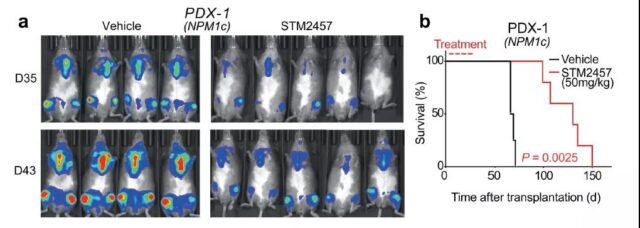M6A methylase METL3 inhibitor effective for the progression of leukemia
- Normal Liver Cells Found to Promote Cancer Metastasis to the Liver
- Nearly 80% Complete Remission: Breakthrough in ADC Anti-Tumor Treatment
- Vaccination Against Common Diseases May Prevent Dementia!
- New Alzheimer’s Disease (AD) Diagnosis and Staging Criteria
- Breakthrough in Alzheimer’s Disease: New Nasal Spray Halts Cognitive Decline by Targeting Toxic Protein
- Can the Tap Water at the Paris Olympics be Drunk Directly?
M6A methylase METL3 inhibitor effective for the progression of leukemia
M6A methylase METL3 inhibitor effective for the progression of leukemiaNature: A new era of cancer treatment! M6A methylase METL3 inhibitor, effectively inhibiting the progression of leukemia
As we all know, our genetic code is written by DNA, but protein is the executor of life activities. In order to synthesize protein, we must first convert DNA into RNA. Protein synthesis is regulated by enzymes.
Enzymes regulate the production of proteins by chemically changing RNA. Sometimes improper regulation of these enzymes can lead to unbalanced protein synthesis.
As early as 2017, Professor Tony Kouzarides from the University of Cambridge published a paper in Nature and found that overexpression of the m6A methylase METL3 promotes the development of acute myeloid leukemia (AML) [1].
Acute myeloid leukemia is a clonal malignant proliferative disease of myeloid blasts of the hematopoietic system. It is a highly heterogeneous disease group. It can be malignantly transformed from hematopoietic progenitor cells at different stages during the differentiation and development of normal myeloid cells Conversion.
The disease develops rapidly and requires immediate treatment, but about 70% of patients who get remission will eventually relapse and evolve into refractory leukemia, leading to treatment failure and death.
On April 26, 2021, researchers from the University of Cambridge, UK and Storm Therapeutics, UK, published a research paper titled: Small molecule inhibition of METTL3 as a strategy against myeloid leukaemia [2] in the Nature journal.
For the first time, the research team has identified STM2457, a small molecule inhibitor of the m6A methylase METL3 that is active in the body, and further confirmed that the inhibitor can effectively inhibit the development of acute myeloid leukemia (AML).
The research means that scientists have taken an encouraging step towards the development of new drugs for the treatment of acute myeloid leukemia.

Previously, the research team had determined that overexpression of the m6A methylase METL3 would promote the development of acute myeloid leukemia (AML). In order to find an inhibitor of METL3, Professor Tony Kouzarides worked with Storm Therapeutics Company and Wellcome Trust Sanger Research Institute to make a final screening. Here comes the small molecule STM2457.
STM2457 can directly bind to METL3 enzyme, thereby inhibiting its activity, and does not affect the function of other methylases. Therefore, STM2457 is a specific inhibitor of METL3 enzyme.

In order to study the potential of STM2457 in the treatment of human leukemia, the research team tested the drug on cancer cell lines derived from patients with acute myeloid leukemia (AML) and found that the drug significantly reduced the growth and proliferation of these cancer cells. Apoptosis to kill these cancer cells.
Next, the research team transplanted these cancer cell lines derived from patients with acute myeloid leukemia (AML) into immunocompromised mice to construct a mouse model of acute myeloid leukemia. Then, the in vivo verification experiment of STM2457 was carried out. The results showed that STM2457 inhibited the proliferation and expansion of cancer cells, and significantly prolonged the lifespan of mice. At the same time, there are no obvious toxic side effects and no effect on body weight.

The above-mentioned experimental results show that STM2457 can inhibit the carcinogenesis caused by the overexpression of METTL3 enzyme in both in vitro cell experiments and in vivo animal experiments.
Professor Tony Kouzarides said that protein is very important to our body functions. Its production process involves the use of enzymes to convert DNA into RNA. Once this process goes wrong, it often has destructive consequences for health. But so far, no one has used this important process as a means to fight cancer. This research represents the beginning of a new era of cancer treatment.
Acute myeloid leukemia is an aggressive cancer that develops rapidly and requires treatment as soon as possible after diagnosis. However, about 70% of patients in remission will eventually relapse and evolve into refractory leukemia, leading to treatment failure and death.
The research team stated that it hopes to start human clinical trials as early as next year, and also expects that the clinical trials will bring more good news to patients and their families with acute myeloid leukemia.
(source:internet, reference only)
Disclaimer of medicaltrend.org



